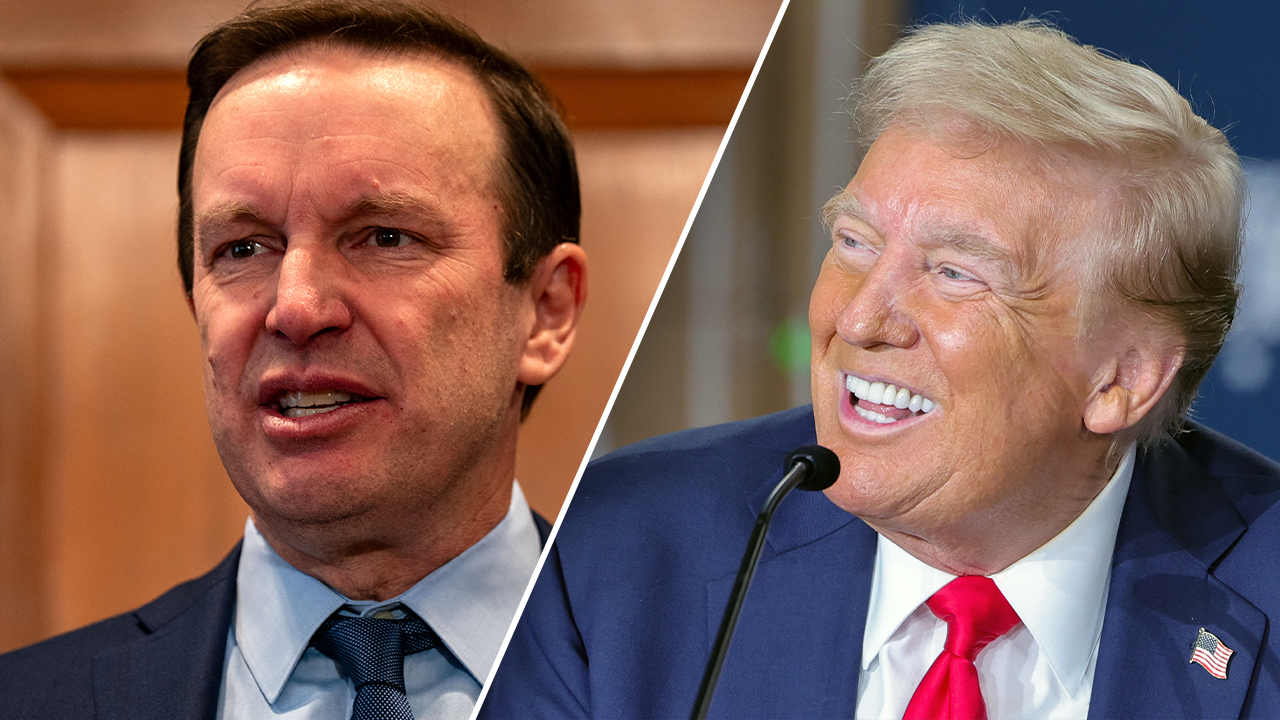Politics
White House scorches ‘moron’ left-wing senator for seething over ‘obvious’ Trump family parody account

The White House and Sen. Chris Murphy’s Social Media Clash: A Breakdown of the Controversy
A Misunderstanding on Social Media Sparks Tension
In a volatile exchange on social media, the White House recently lashed out at Democratic Senator Chris Murphy of Connecticut, calling him a "moron" after he mistakenly believed a parody account belonging to a Lara Trump fan page was the official account of the president’s daughter-in-law. The incident unfolded when Murphy responded to a post that appeared to suggest support for the arrest of Rep. Alexandria Ocasio-Cortez (D-N.Y.) for providing guidance to immigrants on avoiding deportation. Murphy’s reaction, filled with expletives, criticized the Trump administration for what he perceived as hypocrisy on free speech. However, his outrage was quickly deflated when it became clear that the post in question was not from Lara Trump but from a parody account. The White House, through its rapid response account, Rapid Response 47, seized the opportunity to lambast Murphy, stating, "You are a moron, Chris. It is obvious this page is not affiliated with President Trump, his family, or the administration." The response also mocked Murphy’s gaffe, saying, "We do, however, support your right to make such a statement, no matter how imbecilic it makes you look."
The Role of Parody Accounts in the Digital Age
At the heart of this controversy is the challenges posed by parody accounts on social media platforms. The "Lara Trump Page," which Murphy mistakenly believed was Lara Trump’s official account, is a fan-run parody account that often posts content critical of the Trump administration or its allies. The specific post that caught Murphy’s attention was a provocative statement: "If you support Border Czar Tom Homan arresting AOC for giving illegal aliens instructions on how to avoid deportation, post a [thumbs up emoji] in the comments. Make your voice heard." The post was likely referencing recent events involving Rep. Ocasio-Cortez, who had shared a "Know Your Rights" guide for immigrants, which some interpreted as instructions on how to evade deportation. While the parody account’s intent was satirical, it clearly succeeded in tricking Murphy, leading to his misunderstanding and subsequent public embarrassment.
Senator Murphy’s Reaction and the Aftermath
Sen. Chris Murphy’s response to the parody post was passionate and deeply critical of the Trump administration. He wrote, "It takes some f—ing gall to have Vance lecturing Europe on ‘free speech’ when at the exact same time the Trump regime is threatening Democrats back home with arrest if they even explain people’s rights to them." Murphy’s statement reflected his outrage over what he perceived as a double standard on free speech, given the administration’s rhetoric on the issue abroad while seemingly targeting political opponents at home. However, his fiery response was quickly called out when a community note was attached to his tweet, clarifying that the post he was referencing came from a parody account and not Lara Trump herself. Despite this, Murphy’s office did not immediately respond to requests for comment, leaving the senator’s public image bruised but not entirely derailed.
The White House’s Rapid Response: A Strategic Communication Tactic
The White House’s Rapid Response 47 account, launched in January, is part of a broader strategy to combat what the administration deems "fake news" and to push back against its critics in real time. The account’s assertive response to Murphy’s mistake was characteristic of its mission, combining sharp language with pointed criticisms aimed at discrediting opponents. By labeling Murphy a "moron," the White House not only capitalized on his error but also sought to undermine his credibility and credibility more broadly among his Democratic colleagues. This approach reflects a larger pattern of aggressive communication from the Trump administration, which often uses social media to bypass traditional media outlets and directly engage with its base while berating its critics.
The Broader Implications: Free Speech, Immigration, and Political Theatre
The controversy touches on several larger issues that have defined American politics in recent years. First, it highlights the ongoing debate over free speech and its perceived erosion under the Trump administration. Murphy’s initial reaction was rooted in his concern that the administration was targeting political opponents for arrest, which he framed as a direct threat to free speech. On the other hand, the administration has long positioned itself as a defender of free speech, particularly in international contexts, adding fuel to Murphy’s charge of hypocrisy. Second, the issue of immigration and deportation continues to be a polarizing topic, with the administration’s hardline stance drawing criticism from Democrats like Ocasio-Cortez and Murphy. Finally, the episode underscores the role of social media as both a tool for political engagement and a source of confusion and misinformation.
Conclusion: A Glimpse into the Polarized PoliticalClimate
The clash between the White House and Sen. Chris Murphy over a parody account offers a microcosm of the deeply polarized political climate in America. On one side, the Trump administration continues to use aggressive rhetoric and rapid-response tactics to attack its critics, often blurring the lines between fact and fiction. On the other side, opponents like Murphy and Ocasio-Cortez are increasingly vocal in their criticism of what they see as overreach and hypocrisy from the administration. While the incident itself may seem trivial, it speaks to the broader challenges of navigating truth and misinformation in the digital age. As the 2024 election looms, such exchanges are likely to become even more frequent, further dividing an already fractured political landscape.


















